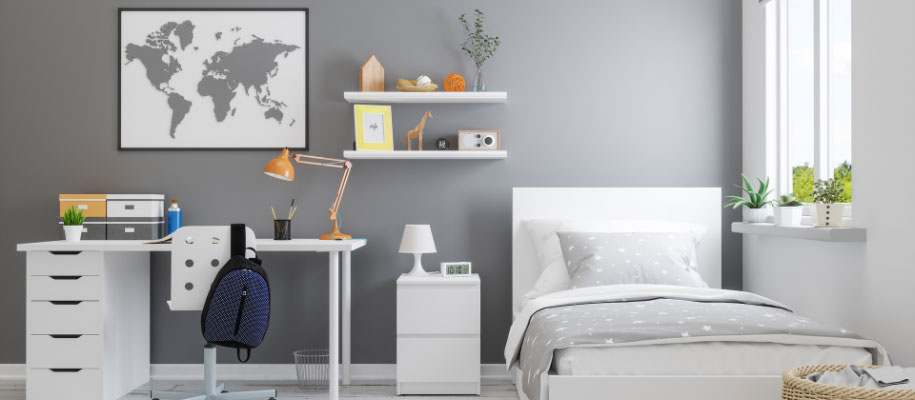Creating a productive and organized study space is essential for effective learning in high school and college. A well-designed environment can significantly impact your ability to focus, retain information, and succeed academically. Let’s explore the critical elements of building an optimal study space that maximizes efficiency and minimizes distractions.
1. Choose the right location
Choosing the right location for your study space is the first step toward productivity. Consider factors like noise levels, proximity to distractions, and access to natural light. Select a quiet corner of your home or the library away from high-traffic areas that also offer adequate lighting. A dedicated study room is ideal, but only some have that luxury. A quiet bedroom or living room corner can also work well.
Related: Video: What's the Best College Study Spot?
2. Consider ergonomics and comfort
Investing in a comfortable and ergonomic study chair and desk is crucial, as your posture and physical comfort significantly affect your ability to focus and study efficiently. Ensure that your chair supports your back and that the desk is at an appropriate height to prevent strain and discomfort during long study sessions.
3. Get organized
A cluttered study space can be a significant distraction. Keep your workspace organized with storage solutions like shelves, drawers, or file cabinets to stow away textbooks, stationery, and other materials. Also utilize organizers and trays to keep smaller items like pens, pencils, and paper neatly arranged.
4. Personalize your space to get inspired
You can customize your study space with a variety of elements that inspire you. Whether it's motivational quotes, artwork, or personal mementos, surrounding yourself with positive and motivating decor can boost your productivity. However, be mindful not to over-clutter with decorations that can become distractions.
5. Ensure you have adequate lighting
Proper lighting is crucial for reducing eye strain and maintaining focus. A combination of natural and artificial lighting is ideal. Position your desk near a window to benefit from natural light during the day. In the evening, invest in a good desk lamp with adjustable brightness to ensure optimal lighting conditions.
Related: How to Make Your Dorm the Perfect Study Space
6. Minimize digital distractions
In today's digital age, managing technology in your study space is essential. Keep your phone, tablet, and other potential distractions out of arm's reach. Also consider using website blockers or apps that temporarily limit your access to social media and other distracting websites during study hours.
7. Add some time management tools
Incorporating time management tools into your study space will help you stay on track. A wall calendar, digital timer, or whiteboard for setting daily goals and tracking progress can be invaluable. When you’re settled into a study session, break it into manageable chunks with scheduled breaks to prevent burnout.
8. Cut down the noise
Controlling noise levels in your study space is vital. If you’re in a busy space and can’t avoid the noise, consider using noise-canceling headphones or playing soft, instrumental music to create a soothing auditory backdrop. Find what works best for you to drown out distractions effectively.
9. Don’t forget about regular maintenance
Maintaining your study space regularly will keep it organized and conducive to productivity. Schedule periodic cleanups and decluttering sessions to ensure your workspace remains an environment that supports your focus and success. Change your desk as needed as well; seeing what works best for you often takes trial and error.
Related: Operation Anti-Clutter: How to Clean Up Your Dorm Room
A well-organized, productive study space is invaluable to your educational journey. By carefully selecting the right location, creating a comfortable and personalized environment, and implementing tools for time management and focus, you can significantly enhance your ability to learn and retain information effectively. Remember that the key is to tailor your study space to your unique preferences and needs, allowing you to reach your full academic potential.
Looking for even more ways to get organized as a student? Check out the “organization" tag for advice on managing your time, keeping a planner, taking notes, and keeping track of everything!





